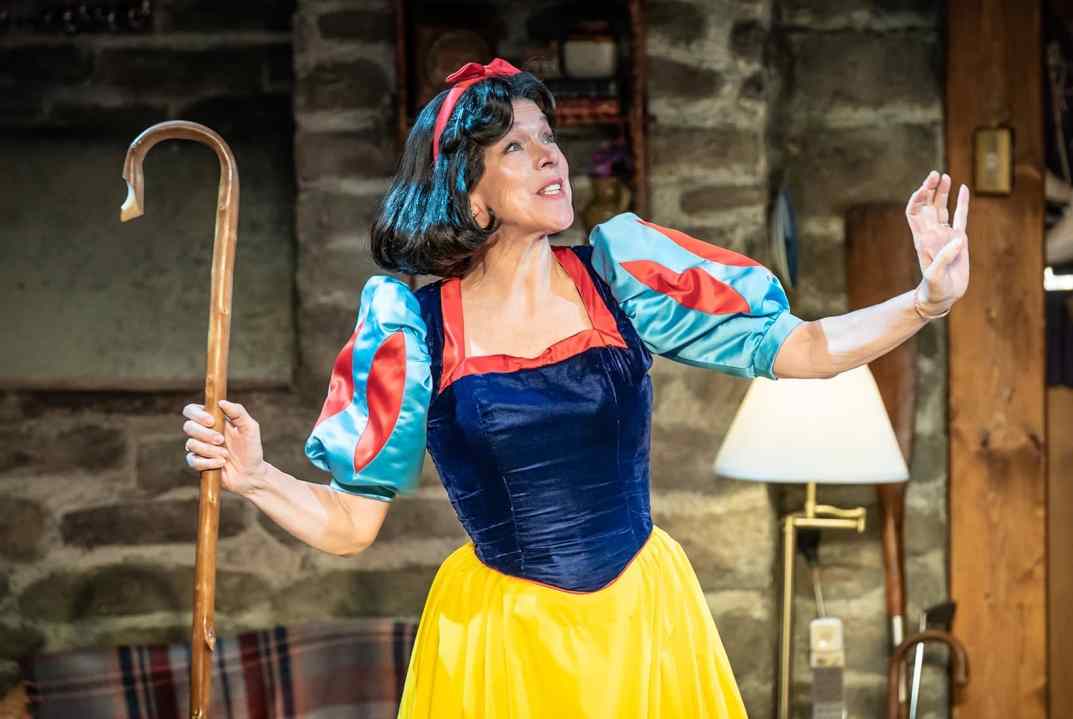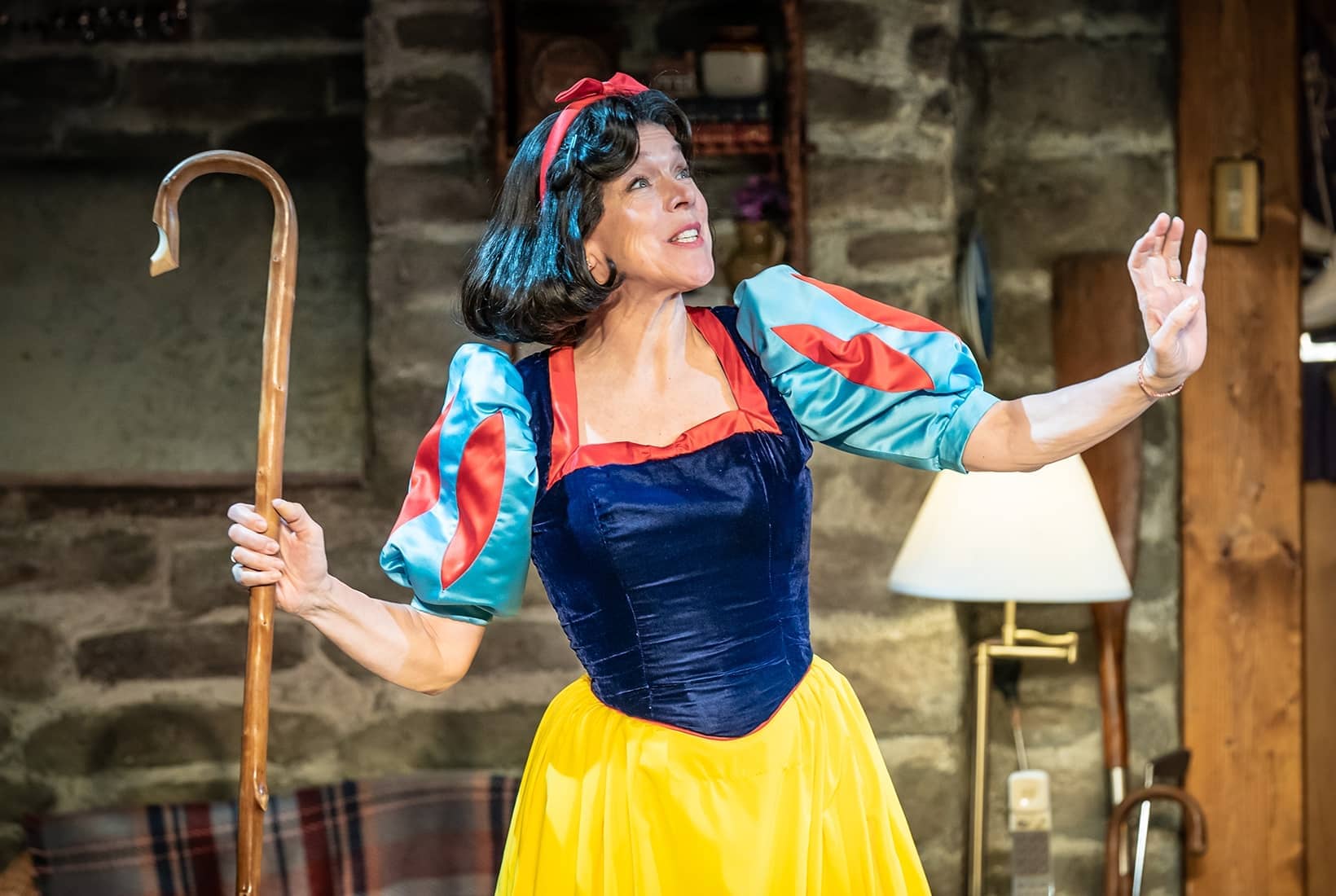World-class sex bomb Janie Dee stars in a fabulously silly revival of the American comedy Vanya and Sonia and Masha and Spike. She plays a movie diva, Masha, who loves to flaunt her wealth in front of her mousy sister and bookish brother. Striding into the family home with her long hair flying and her scarlet lips curling, she narrows her eyes and flings shafts of desire in all directions. Then she arches her neck and tosses back her head to give her bust an extra half-inch of uplift. A stunning display.
The show is about three middle-aged siblings whose over-intellectual parents named them after characters in Chekhov plays. Vanya is a hopeless dreamer. Sonia pines for sexual attention but can’t compete with Masha whose dazzling looks are fading and whose young boyfriend, Spike, has a wandering eye. The characters are invited to a fancy-dress party and bossy Masha decides to go as Snow White. Her siblings, she insists, must dress as dwarfs. She drags along an ambitious young thesp, Nina, who dotes on Masha and covets her fame and success.
There’s a full set of victims and survivors but they want us to feel good about life
It sounds a little contrived but the ramshackle structure is cleverly handled by the writer, Christopher Durang, who knows how to use sex to keep a story moving. And he maintains a good strike rate of gags. In places it’s as corny as hell and the Chekhov references are laid on with a trowel but the spirit is capricious and fun-loving, never earnest. Director Walter Bobbie knows exactly what he wants from this caper — to take the audience on a wild two-hour ride.
The six characters also embody many of the hot-button issues favoured by progressive theatres: Vanya is gay, Sonia is adopted, Spike is bi-curious, Masha is a sex addict, Nina is mixed-race and the maid, Cassandra, is mentally unstable. That’s a full set of victims and survivors. But these misfits don’t thrust their pain down the viewer’s throat or beg for people to ‘reach out’ to them. They want us to feel good about life. The result is a night of guilt-free hilarity.
The Royal Court is also examining issues that trouble the liberal mindset. Its latest drama, Rare Earth Mettle, looks at the exploitation of the world’s poor by evil capitalists. This vapid, sprawling yarn could do with a dose of sex as well. No character has any romantic yearnings at all, and the story feels as insipid as soggy tobacco.
The script opens with America’s stupidest billionaire, Henry Finn, discovering a dried-up lake in Bolivia where 70 per cent of the world’s lithium supplies lie buried. He tries to buy the lot for $10,000 from a surly peasant who hates Americans. Meanwhile in London another wicked schemer, Dr Anna, wants to grab the seam of lithium to solve the world’s mental-health crisis. She’s discovered a miracle cure that she plans to test by dumping lithium into the water supply of Stockport which — she quips — has more mental-health problems than anywhere else in Britain. (Obviously the ‘half-witted northerner’ joke is a favourite at the Court.)
Dr Anna is played as a heartless Home Counties hag by Genevieve O’Reilly who gives her a pre-war Celia Johnson accent. The word ‘probity’ gets five syllables —‘praya-buh-tier’. She sounds posher than the Queen. The storyline rattles through a predictable list of crimes as Dr Anna and Henry Finn travel the world oppressing the weak, grabbing their assets and silencing dissenters with huge bribes. But something unexpected emerges. The dominant characters have all the wealth and authority because the script appears to regard them as naturally gifted. The reason they have the expertise to build battery-powered cars and find cures for ghastly diseases is that they’re smarter than their rivals.
The Bolivians try to pull a fast one by inventing a fictional new tribe but they ask a white ethnographer to validate their claim. What a bizarre idea. Do Anglo-Saxons know more about Bolivia than Bolivians? The play also assumes that no one in South America speaks a word of English unless they’ve graduated from a western university. The whole drama is stuck in the 19th century. Even a sick Bolivian teenager tells Dr Anna about the inevitable triumph of the West. ‘I don’t think you’ll ever run out of ideas,’ she lisps, ‘especially where you’re from.’
To be fair, this three-hour play feels as indigestible as the policy lecture it aspires to be. The Court long ago gave up operating as a theatre and decided to become a think tank. Perhaps this latest flop will convince the entire panel of directors to resign — apart from the publicists who are great fun and who bake lovely handmade sausage rolls for the critics on press night. Their toasty bite-sized treats are the only competent service this embarrassing dump provides. Could it reopen as a patisserie?








Comments